
Inledning
Vänligen läs mitt tidigare inlägg om ICSID för en detaljerad redogörelse av hur en ICSID-process ser ut.
Både Gambia och Senegal har skrivit under ICSID-konventionen.
Det står klart att dispyter mellan Gambia och internationella investerare kommer att hanteras av ICSID.
Gambia och African Petroleum Corporation har också varit inblandade i en liknande dispyt tidigare, också då gällande licenserna A1 och A4.
Under de senaste decennierna har internationella tribunaler tagit upp många av energisektorns problem och aspekter. Dessa har inkluderat fordringar enligt bilaterala avtal och sedvanlig internationell lag som handlar om expropriationer, orättvis och ojämlik behandling och det internationella brottet olaga eller orättvis rättegång eller påföljd (denial of justice).
Afrikanska stater inblandade i 135 st av samtliga ICSID-fall
Av samtliga fall som varit föremål för behandling av ICSID har afrikanska länder varit inblandade i 22% av dem. Detta motsvarar 135 fall.
Gambia och Senegal har varit inblandade i 4 st fall vardera.
Av dessa 135 fall avgjordes 91 % under ICSID Convention Arbitration (när det inblandade landet är medlem i och/eller har ratificerat ICSID-konventionen.)
De 135 dispyterna som involverat en afrikansk stat har uppstått inom många olika ekonomiska sektorer.
Dispyter gällande olje-, gas- och gruvutvinning utgör hela 45 st av de 135 fallen
Den enskilt största sektorn som drabbats av dispyter i de afrikanska staterna är olje-, gas- och gruvindustrin. Dessa fall utgör hela 45 av de 135 fallen (33%). Av samtliga ICSID-fall under 2014 är motsvarande siffra 35%.
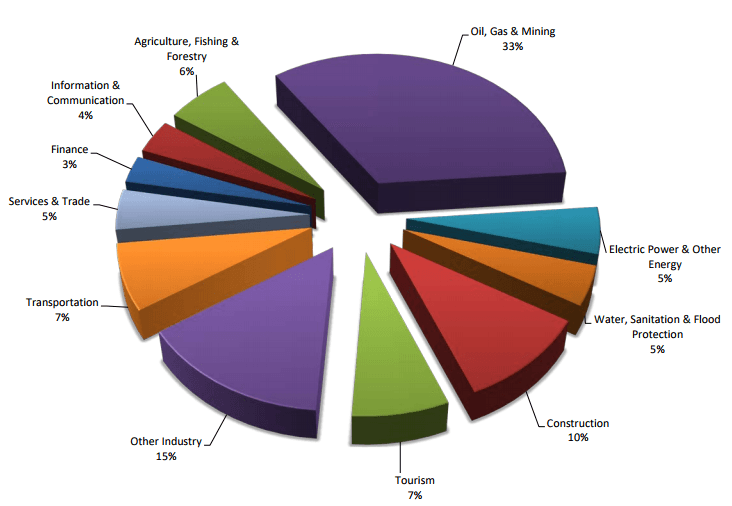 The 135 disputes involving an African State arose in the context of a variety of economic sectors
The 135 disputes involving an African State arose in the context of a variety of economic sectors
107 av de 135 dispyterna initierades av utländska investerare
Av de 135 dispyterna initierades 28 st (21%) av afrikanska investerare.
I de resterande 107 fallen initierades dispyterna av icke-afrikanska investerare, såsom African Petroleum Corporation Limited.
57 av 135 fall löstes genom att parterna kom överens, eller genom att processen avbröts, före ett beslut av ICSID
57 st (42%) av dispyterna nådde en lösning genom att inblandade parter kom överens eller genom att processen av en av anledningarna nedan avbröts (Dispute settled or proceeding otherwise discontinued) före ett beslut av ICSID-tribunalen.
Så här ser fördelningen ut (se begreppsförklaringar i slutet av texten).
34 st – processen avbröts på båda parternas begäran (discontinued)
11 st – processen avbröts på den ena partens begäran (discontinued)
7 st – Överenskommelse genom att båda parterna lämnar in en gemensam lösning och begär att ICSID ska bifalla detta utslag (Settlement agreement embodied in an award at parties’ request).
4 st – Processen avbryts pga misslyckande med att betala in den nödvändiga avgiften för processen (Proceeding discontinued for lack of payment of the required advances).
1 st – Processen avbryts för att någon av parterna inte uppfyller kraven om att agera inom sex månader (Proceeding discontinued for failure of parties to act).
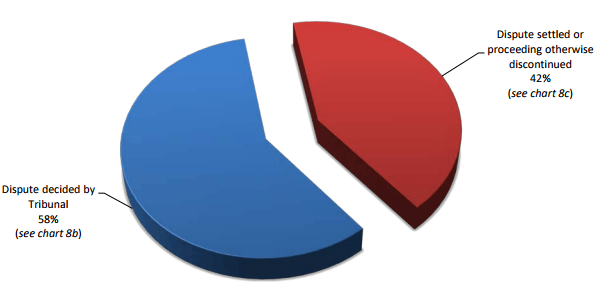 Arbitration Proceedings under the ICSID Convention and Additional Facility Rules involving an African State Party – Outcomes:
Arbitration Proceedings under the ICSID Convention and Additional Facility Rules involving an African State Party – Outcomes:
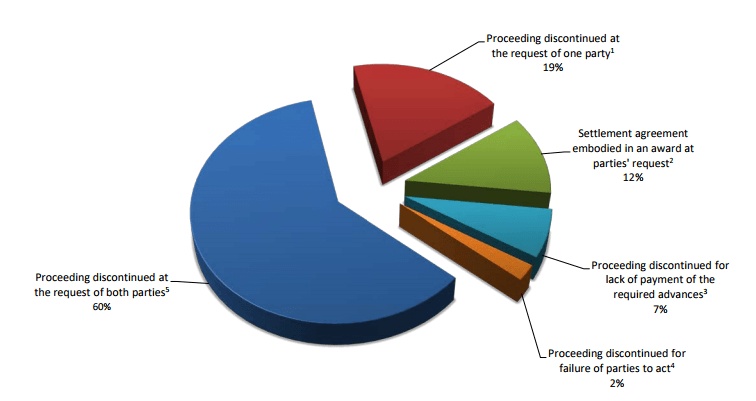 Disputes Settled or Proceedings Otherwise Discontinued under the ICSID Convention and Additional Facility Rules involving an African State Party – Basis
Disputes Settled or Proceedings Otherwise Discontinued under the ICSID Convention and Additional Facility Rules involving an African State Party – Basis
78 av 135 fall avgjordes genom ett beslut av ICSID
De resterande 78 fallen (58%) avgjordes genom ett slutgiltigt beslut från en ICSID-tribunal. Här ser fördelningen ut så här:
I 17 st (22%) av besluten avgjordes pga att ICSID avfärdade jurisdiktionen (dispyten behandlades inte eftersom dispyten inte ansågs falla under ICSID-konventionen)
I 17 st (22%) av fallen beslutade ICSID att avfärda alla krav
I 44 st (56%) av fallen beslutade ICSID att bifalla hela eller delar av kraven
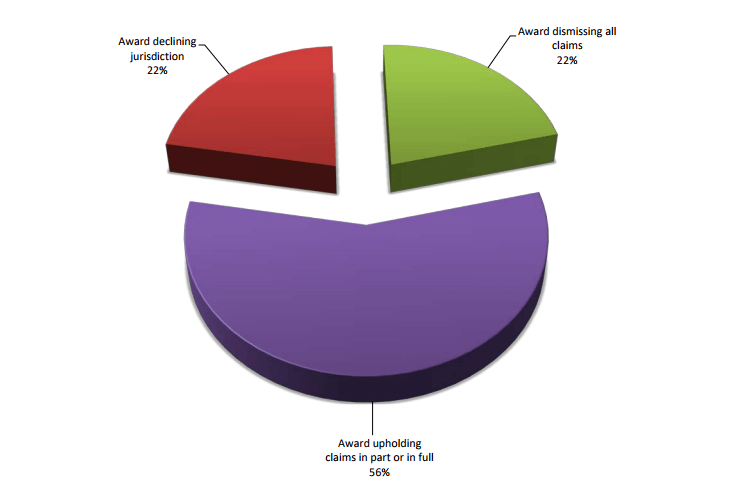 Disputes Decided by Arbitral Tribunals under the ICSID Convention and Additional Facility Rules involving an African State Party – Findings
Disputes Decided by Arbitral Tribunals under the ICSID Convention and Additional Facility Rules involving an African State Party – Findings
*Sammanställning av samtliga skiljeförfaranden som involverar en afrikansk stat (ICSID-beslut/Tribunal Rulings, överenskommelser/Settlement och avslutning/Discontinuances)
I bilden nedan skildras alltså en sammanställning av hur samtliga 135 fall som involverat en afrikansk stat har slutat.
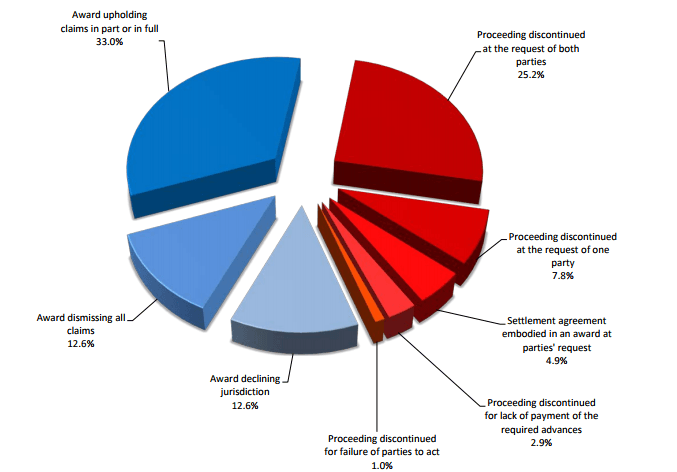 Arbitration Proceedings under the ICSID Convention and Additional Facility Rules involving a State Party involving an African State – Tribunal Rulings, Settlement & Discontinuances
Arbitration Proceedings under the ICSID Convention and Additional Facility Rules involving a State Party involving an African State – Tribunal Rulings, Settlement & Discontinuances
Begreppsförklaringar (på engelska) An arbitration award (or arbitral award) is a determination on the merits by an arbitration tribunal in an arbitration, and is analogous to a judgment in a court of law. It is referred to as an 'award' even where all of the claimant's claims fail (and thus no money needs to be paid by either party), or the award is of a non-monetary nature. Settlement and Discontinuance At any time before the award is rendered, parties may jointly request that the Tribunal discontinue the proceeding if they settle the dispute or for any other reason (Arbitration Rule 43). The Tribunal (or the Secretary-General if the Tribunal is not yet constituted) can issue an order taking note of the discontinuance of the proceeding (Arbitration Rule 43(1)). Alternatively, the parties can ask the Tribunal to render an award embodying the settlement agreement (Arbitration Rule 43(2)). If so, the full and signed text of their settlement agreement must be filed with the Secretary-General. Discontinuance at Request of a Party If one party requests the discontinuance of the proceeding, the other party will be invited to state whether it agrees with the discontinuance (Arbitration Rule 44). If that party objects, the proceeding will continue. However, if that party agrees or does not object within the fixed time limit, the party will be presumed to have consented to the discontinuance. Accordingly, the Tribunal or the Secretary-General will issue an order taking note of the discontinuance of the proceeding. Discontinuance for Failure of Parties to Act The proceeding is discontinued when the parties fail to take any steps for a period exceeding six consecutive months or such other period as the parties may agree with the approval of the Tribunal(Arbitration Rule 45). Usually, the parties are given notice approximately one month before the expiration of the six-month period. The notice allows the parties to act if they wish to avoid the discontinuance. If the parties take no action to continue the proceedings, the Tribunal or the Secretary-General may issue an order of discontinuance. This rule does not apply if a stay of the proceeding is agreed. Discontinuance for Lack of Payment of Required Advances Except in annulment proceedings, both parties are responsible for paying the advances to meet the costs of the proceeding unless the parties agree or the Tribunal decides otherwise (Administrative and Financial Regulation 14(3)(d)). Failure to do so may lead to the discontinuance of the proceeding. If the amounts requested are not paid in full within 30 days of a request, the Secretary-General informs both parties of the default and gives either of them an opportunity to make the outstanding payment. If any part of the required payment remains outstanding 15 days after notice of default is given, the Secretary-General may ask that the Tribunal stay the proceeding. If any proceeding is stayed for non-payment for a consecutive period in excess of six months, the Secretary-General may ask that the Tribunal discontinue the proceeding (Administrative and Financial Regulation 14(3)). The Tribunal’s decision to discontinue the proceeding will take the form of an order. Effect of the Discontinuance An order taking note of the discontinuance of the proceeding does not dispose of any of the claims raised by the parties. The claims can therefore be raised again in subsequent proceedings. Unlike the order, an award embodying the parties’ settlement agreement pursuant to Arbitration Rule 43(2) is an award under Article 53(1) of the ICSID Convention for the purposes of recognition and enforcement. Källa: [https://icsid.worldbank.org/en/Pages/process/Discontinuance-of-Proceedings.aspx](https://icsid.worldbank.org/en/Pages/process/Discontinuance-of-Proceedings.aspx)